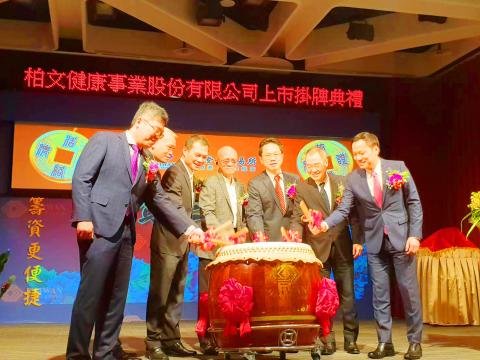Power Wind Health Industry Inc (柏文健康事業), also known as Fitness Factory (健身工廠), became the first gym chain to list on the Taiwan Stock Exchange (TWSE) yesterday.
At the end of the session, Power Wind shares closed at their issue price of NT$180, with 143,000 shares changing hands on the main board, while the TAIEX ended up 0.88 percent at 10,439.24 points.
The Power Wind stock came off an early high of NT$185 as investors locked in their early gains, dealers said.

Photo: CNA
Power Wind chairman George Chen (陳尚義) said that he is upbeat about the outlook for the local gym industry, which has seen an almost 25 percent compound annual growth rate in terms of sales since 2011, and has been attracting investors such as banks and convenience store chains.
Power Wind plans to open six new gyms by the end of the year in New Taipei City, Taoyuan, Hsinchu, Taichung, and Yunlin and Pingtung counties, which would bring its total number to 45, Chen said, adding that the firm hopes to increase the figure to 80 by the end 2025.
In March 2016, Power Wind launched a listing on the local over-the-counter market. The stock gained 25 percent over the past four-and-a-half months after the announcement that it was to be listed on the main board.
Last year, Power Wind posted a 32 percent increase in consolidated sales to NT$3.012 billion (US$97.5 million). Net profit attributable to the parent company grew 62.28 percent to NT$444 million, with earnings per share of NT$7.69.
On Tuesday, the company proposed a dividend of NT$6.35 per share, consisting of a cash dividend of NT$5.35 and a stock dividend of NT$1.
Ministry of Finance data showed that the domestic fitness center and health club industry grew by 28.13 percent last year to register NT$10.08 billion in revenue.

When Lika Megreladze was a child, life in her native western Georgian region of Guria revolved around tea. Her mother worked for decades as a scientist at the Soviet Union’s Institute of Tea and Subtropical Crops in the village of Anaseuli, Georgia, perfecting cultivation methods for a Georgian tea industry that supplied the bulk of the vast communist state’s brews. “When I was a child, this was only my mum’s workplace. Only later I realized that it was something big,” she said. Now, the institute lies abandoned. Yellowed papers are strewn around its decaying corridors, and a statue of Soviet founder Vladimir Lenin

UNIFYING OPPOSITION: Numerous companies have registered complaints over the potential levies, bringing together rival automakers in voicing their reservations US President Donald Trump is readying plans for industry-specific tariffs to kick in alongside his country-by-country duties in two weeks, ramping up his push to reshape the US’ standing in the global trading system by penalizing purchases from abroad. Administration officials could release details of Trump’s planned 50 percent duty on copper in the days before they are set to take effect on Friday next week, a person familiar with the matter said. That is the same date Trump’s “reciprocal” levies on products from more than 100 nations are slated to begin. Trump on Tuesday said that he is likely to impose tariffs

HELPING HAND: Approving the sale of H20s could give China the edge it needs to capture market share and become the global standard, a US representative said The US President Donald Trump administration’s decision allowing Nvidia Corp to resume shipments of its H20 artificial intelligence (AI) chips to China risks bolstering Beijing’s military capabilities and expanding its capacity to compete with the US, the head of the US House Select Committee on Strategic Competition Between the United States and the Chinese Communist Party said. “The H20, which is a cost-effective and powerful AI inference chip, far surpasses China’s indigenous capability and would therefore provide a substantial increase to China’s AI development,” committee chairman John Moolenaar, a Michigan Republican, said on Friday in a letter to US Secretary of

Taiwan Semiconductor Manufacturing Co’s (TSMC, 台積電) market value closed above US$1 trillion for the first time in Taipei last week, with a raised sales forecast driven by robust artificial intelligence (AI) demand. TSMC saw its Taiwanese shares climb to a record high on Friday, a near 50 percent rise from an April low. That has made it the first Asian stock worth more than US$1 trillion, since PetroChina Co (中國石油天然氣) briefly reached the milestone in 2007. As investors turned calm after their aggressive buying on Friday, amid optimism over the chipmaker’s business outlook, TSMC lost 0.43 percent to close at NT$1,150